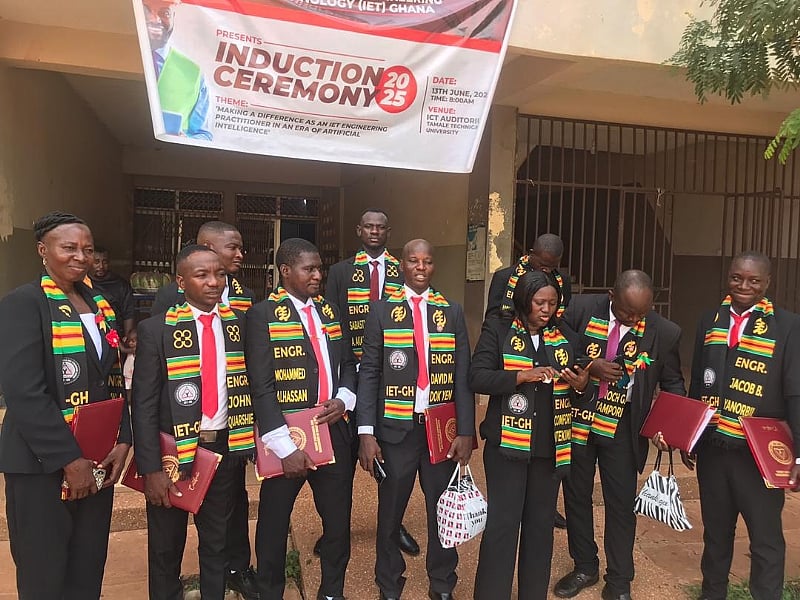The Institution of Engineering and Technology, Ghana (IET-GH) Northern Branch recently inducted a new cohort of engineering professionals, emphasizing the critical need for lifelong learning and the integration of emerging technologies like AI and the Internet of Things (IoT). The induction ceremony, held at Tamale Technical University, served as a platform to underscore the evolving role of engineers in addressing global challenges and shaping a sustainable future. IET-GH National President, Engr. Henry Kwadwo Boateng, challenged the inductees to be at the forefront of innovation, urging them to lead the development of smarter, more efficient, and environmentally responsible systems. He stressed the importance of continuous learning to keep pace with the rapid advancements in technology, particularly in areas like AI and IoT, which hold immense potential for transformative solutions.
Engr. Boateng highlighted the pressing global issues facing humanity, including climate change, environmental degradation, and the growing need for resilient infrastructure. He positioned engineers as key problem-solvers equipped to tackle these challenges, emphasizing that sustainable and resilient engineering is now central to the profession. He encouraged the newly inducted engineers to embrace this responsibility and leverage the power of AI and IoT to create impactful solutions. The theme of the induction ceremony, “Making a Difference as an IET-GH Engineering Practitioner in the Era of AI and the Internet of Things,” reflected this focus on technological advancement and its potential to drive positive change.
The ceremony was attended by prominent figures from academia and industry, signifying the collaborative spirit within the engineering community. Among the attendees were Eng. Seth Ayim, Executive Director, and Eng. Gibson Siayire, Northern Sector Treasurer, both of whom play vital roles in shaping the direction of engineering practice in Ghana. Engr. Boateng celebrated the achievement of the inductees while reminding them that their induction marked not just a professional milestone but also the beginning of a journey defined by innovation, sustainability, and impact. He acknowledged the limitations of current academic systems in keeping up with technological advancements, further reinforcing the importance of continuous learning and professional development.
IET-GH, through its president, reaffirmed its commitment to supporting its members by providing access to training, mentorship, technical resources, and professional networks. Engr. Boateng urged the inductees to let their work be guided by innovation, excellence, and a profound sense of responsibility towards society and the environment. He envisioned a future built by Ghanaian professionals, a future that is sustainable, resilient, and a testament to the power of engineering. This call to action resonated with the overall message of embracing continuous learning and leveraging technology for the betterment of society.
Engr. John Amoah, Northern Sector Chair of IET-GH, also addressed the gathering, highlighting the chapter’s proactive approach in engaging members through in-service training to enhance their professional capacity and support their businesses. He emphasized the chapter’s collaboration with other institutions to uphold high standards and professional ethics in engineering practice. Engr. Amoah expressed concern over the use of substandard materials and the presence of unlicensed individuals posing as qualified engineers, factors that often contribute to infrastructure failures. He warned against the dangers of engaging unqualified individuals, emphasizing that such practices not only jeopardize lives but also undermine the integrity of the profession.
Engr. Amoah urged the public to be vigilant and always verify the credentials of engineers before engaging their services. He stressed the importance of checking licenses and certificates to ensure the engineer’s qualifications and legitimacy. This advice serves as a crucial reminder to prioritize safety and uphold professional standards within the engineering field. The induction ceremony, therefore, served not only as a celebration of new professionals but also as a call to action for both engineers and the public to embrace continuous learning, uphold ethical practices, and leverage technology for a sustainable and resilient future.














